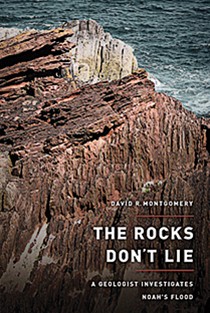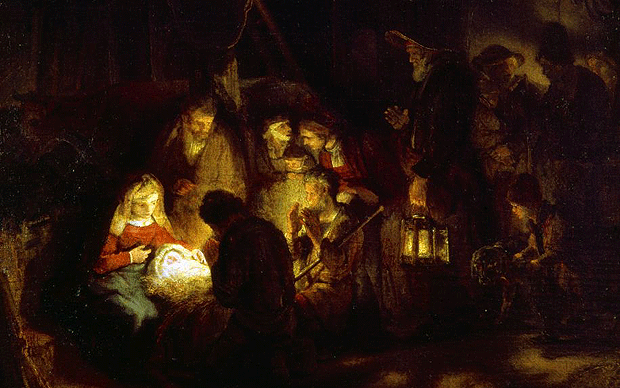The Rocks Don’t Lie
 One of C.S. Lewis’s most oft-quoted statements concerns selective reading. “A young man who wishes to remain a sound Atheist cannot be too careful of his reading,” he writes in Surprised by Joy. “There are traps everywhere.”
One of C.S. Lewis’s most oft-quoted statements concerns selective reading. “A young man who wishes to remain a sound Atheist cannot be too careful of his reading,” he writes in Surprised by Joy. “There are traps everywhere.”
It comes to mind as I finish David R. Montgomery’s The Rocks Don’t Lie: A Geologist Investigates Noah’s Flood — except that it’s the Young Earth Creationist who must be careful, for, as Montgomery shows, there are traps laid everywhere. Literally. The ground under our feet is full of them: layers of sediment, folded rock, fossils, patterns worn into Earth’s surface, archaeological finds, all of which tell a story of a planet almost unfathomably old.
For those who insist on a literal reading of Genesis and a 6,000-year-old Earth remodeled by Noah’s flood, there is plenty here to challenge and inform. But there is also plenty of food for thought for the Atheist who regards religion as childish superstition. What distinguishes this book is its its combination of thoroughness and civility. Montgomery discusses the long and complicated relationship between faith and science with a welcome graciousness to both sides. I found the book to be a readable, educational, and inspiring introduction both to geology and to the (surprisingly recent) history of the present-day Creationist movement. You can find a summary of the book over at Amazon, and read the annotated table of contents as well. I would prefer to use this space to focus on a few of my own reactions. But in general, Montgomery’s landing place is that science and faith do not have to be opposed to one another. “In reality, faith and reason need not be enemies if one views ignorance as the enemy of both,” he writes. The history of interaction between science and faith shows that both sides can veer into blinding dogmatism.
My only reservation about the book was that at times I felt Montgomery simplified his discussion of the ancient biblical text. When he writes about the discovery of ancient Mesopotamian flood stories as relegating the biblical flood story to a “Babylonian hand-me-down,” he simplifies the nature of influence. I preferred Peter Enns‘ more qualified statement that these tales inhabit the same conceptual world, with both being much older than their written forms can tell us. But this is a minor criticism, because overall I felt that he did the subject justice — more justice, it has to be said, than some Christians untrained in geology have done the subject of Earth’s history. Like Enns, he regards the story’s treatment in Genesis as a possible response to the older tale from a monotheistic point of view. I don’t have a problem with this because it makes sense to me that God could use the basic ingredients of an existing story to distinguish himself from other gods.
As I close The Rocks Don’t Lie, I wonder: What if the worst (from a Creationist perspective) is true, and the Creation story and Noah’s flood are both more legend — divinely inspired and adapted legend — than fact? What if they were never intended to be taken literally as historic accounts, but were rather literary forms available to the ancient writers through which God inspired unique insights into his nature and character? What if they convey a different kind of truth, and a different kind of proof, than some have insisted upon by seeing them as historic narratives?
For myself, I find that my faith as a Christian is not shaken, because I’ve never understood why some feel that these particular stories have to be taken literally to begin with. Much depends on your beliefs concerning the inspiration of Scripture. I believe the Bible is inspired by God. It tells us something about his humility, his desire for relationship, and his respect for his creation that he is willing to work through finite, history-bound human minds to write his holy book rather than dropping it fully-formed from Heaven. It is consistent with the character of a God who is willing to take on human flesh and submit to the limitations not just of a body, but of all the injustice and brutality humans can dish out, all for the purpose of saving humanity. But it also makes the Bible more difficult to understand, and less willing to submit to our modern-day demands for detailed science, accurate history, and standardized time. In the case of the creation and flood stories of Genesis, there are many similarities of plot to older stories from other cultures; yet the distinctiveness of God — for instance, the fact that he is one all-powerful God who envisions a whole different kind of relationship with his created beings — stands in such striking contrast to the way divinity was typically imagined that it is not hard to believe it was God himself who communicated the concept to the biblical writers. There are other details of the story borrowed from earlier stories, but this God is altogether original.
Isn’t it in this sense that our best stories communicate truth? That so many people I know and care about in the Christian community demand that even these ancient stories in the Bible constitute straightforward, literal science testifies to the impoverishment of our culture. We no longer recognize that stories have value, even when they are imaginative rather than documentary truth. In today’s world the emphasis is on “STEM,” with the humanities as a separate and less valued compartment of knowledge. This attitude carries over into the evangelical view of the Bible, in which all seems to depend on mere literal accuracy — rather than truth, which has imaginative dimensions as well. It cannot be reduced entirely to the literal. The prophetic and poetic literature of the Bible itself, along with the parables of Jesus, testify to this.
So does The Rocks Don’t Lie. For the long and mutually stimulating conversation between Christianity and the developing science of geology illustrates the centrality of stories in understanding the earth under our feet. The first geologists were Christians who saw the Earth in terms of Noah’s flood, but who also recognized that Nature is equally a text that tells us about its Creator. When there has been friction between what the Earth reveals and what Scripture seems to be saying, the challenge has been to adapt our understanding of both. Modern Creationists seem to have given up and resorted to arguments that were discredited back in the 19th century, turning away from science altogether and substituting dogma instead. This hearkens back to the Church’s response to Galileo but overlooks centuries of more sensible and faith-filled teaching that Nature and Scripture both reveal God. We may rightly reject intellectual fashions that assume a godless universe, but Christians more than anyone should rise to the challenge of our own profession of faith in the goodness and creative power of God by welcoming scientific discoveries with confidence.
I watched the last installment of the debate between Bill Nye and Ken Ham a few weeks ago, and I was appalled at the lack of scientific observation, knowledge, or curiosity Ham demonstrated. But I find books like this one tremendously stimulating because they open my eyes to the incredible scope, diversity, and order of Nature. I’ve been a Christian for over 30 years now, and I still have questions — especially questions related to the problem of evil. But the more I learn about nature, the more awe I feel toward its Creator — a Creator whose processes are not related in detail in Scripture, but whose personality is stamped in amazing ways on what He has made. It doesn’t shake my faith at all to consider geologic time; it seems appropriate that God would need a grand scale on which to work, and that the clues we uncover about his world would make sense. The excitement of scientists and archaeologists piecing together history is something I can readily enter into. I’m a nature photographer, and the beauty and variety of my own locality continually amaze (and sometimes trouble) me. All of this seems to me to be consistent with the enthusiasm God has throughout the Bible for his Creation. Participating in this with him begins with curiosity and knowledge, and Christians should be among the front-runners in exploring the world they believe to be made, redeemed, and placed under their stewardship by God.
*I edited this post after publication to clarify a few points.



6 Comments
Steve Hersey
Thanks, Janet, for the review which has convinced me to put this book on my list of books to read.
Janet
I’d be interested in what you think if you read it, Steve. Thanks for reading this review!
SethH
I read and enjoyed this one last year, putting it on my favorites list. I, too, am dismayed at the rigidity of the YEC position and confused as to why it’s as popular as it seems to be.
Janet
I read your review recently, Seth — it’s part of why I wanted to read this!
Alice@Supratentorial
Thanks for such a thoughtful review, Janet. I especially loved this: “We no longer recognize that stories have value, even when they are imaginative rather than documentary truth. ” YES! I will have to put this one on my TBR list.
If you are interested in another book on how to reconcile Christianity and science I highly recommend The Language of God by Francis Collins.
Janet
Yes! I read that one too and really liked it.